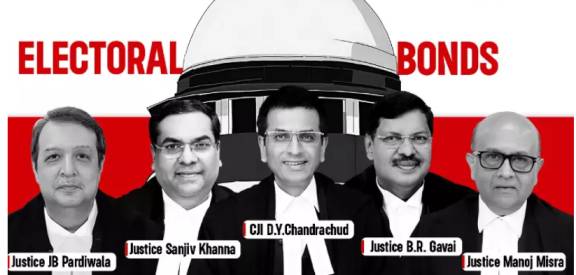Unbonded: On the striking-down of the Electoral Bond Scheme by the Supreme Court
The electoral bonds verdict is a blow for freedom of expression
Anonymous donations of high value tend to undermine electoral democracy and governance as they facilitate a quid pro quo culture involving donors and beneficiaries . In striking down the Electoral Bond Scheme (EBS) under which anyone could buy electoral bonds and donate them to political parties for encashment , the Supreme Court of India has recognised this malaise and struck a blow for democracy and transparency in political funding. The Court found that the entire scheme violates the Constitution, especially the voters’ right to information. It further found manifestly arbitrary , the amendment to the Companies Act that removed the cap of 7.5% of a company’s profit that can be donated to political parties without any requirement to disclose details of the recipient parties in its profit and loss accounts. It has also mandated disclosure of donation details since 2019. The judgment is one more in a long line of verdicts the Court has handed down to promote voter rights and preserve the purity of elections. Its earlier interventions led to the featuring of the ‘None of the Above’ option on the ballot, the removal of the protection given to legislators from immediate disqualification on conviction for a criminal offence, the mandatory disclosure of the assets and criminal antecedents of candidates in their election affidavits and expedited trials for MPs and MLAs involved in criminal offences.
The Court’s reasoning is unexceptionable. It found that the primary justification for the EBS — curbing the use of ‘black money’ for political or electoral funding by allowing donations through banking channels — failed the test of proportionality , as it was not the least restrictive measure to abridge the voters’ right to know. It has made the logical connection between unidentified corporate donations and the likelihood of policy decisions being tailored to suit the donors. The judgment is a natural follow-up to a principle it had laid down years ago that the voters’ freedom of expression under Article 19(1)(a) will be incomplete without access to information on a candidate’s background. The principle has now been extended to removing the veil on corporate donors who may have been funding ruling parties in exchange for favours. While the verdict may help ease the hold that donors may have on governance through money power, a question that arises is whether the validity of the scheme could have been decided earlier or the issuance of bonds on a regular basis stayed . How much of the thousands of crores of rupees given to parties under this scheme resulted in policy measures favourable to the donors or helped fund the deployment of additional campaign resources will never be known. This was a fit case for the grant of an interim stay .
